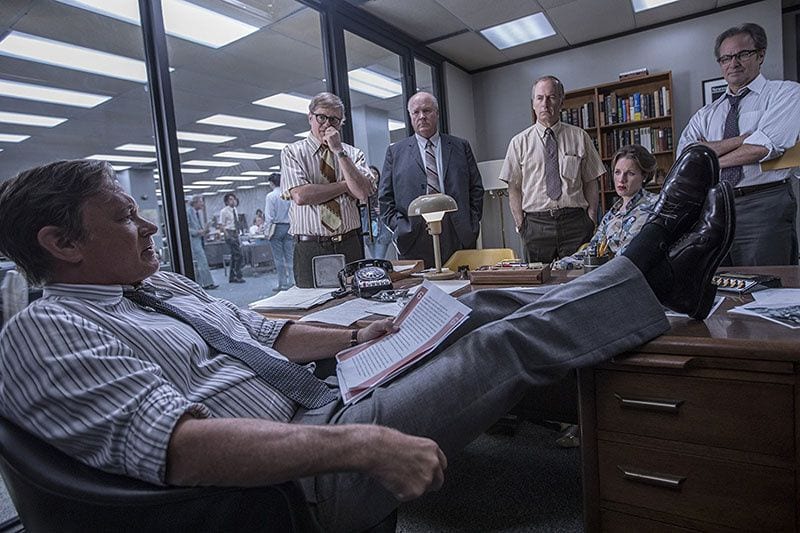One could argue that Steven Spielberg has now made three movies about dinosaurs. The iconic Jurassic Park and its less-than-stellar sequel, The Lost World: Jurassic Park, saw extinct beasts recklessly brought back to life against all logic and good judgement. If only we could find some DNA fragments to resurrect the now-extinct newspaper industry so breathlessly captured in Spielberg’s new ensemble drama, The Post.
Spielberg’s exhilarating love letter to journalistic integrity can be forgiven its self-congratulatory excesses. Led by their tireless executive editor, Ben Bradlee (Tom Hanks), the reporters at The Washington Post broke the biggest stories at a pivotal moment in America’s history. They fueled a post-Vietnam cynicism of authority that still prevails today. Ironically, with most daily publications largely owned and operated by business conglomerates, newspapers must now be regarded through the same cynical eye.
The Post arrives at the beginning of the end for family-run newspapers. It’s 1971 and the matriarch of The Washington Post, Kay Graham (Meryl Streep), whose father nursed the newspaper back from bankruptcy in the ’30s, is taking her “cash poor” legacy public on the New York Stock Exchange. Contentious board members debate share prices and dictate editorial content while Kay sits helplessly to the side, occasionally breaking for a dinner party or photo opportunity. The fact Kay’s father ceded control of the paper to his son-in-law rather than his own daughter isn’t lost on her judgmental colleagues, who view her as a non-entity in their boys-only club.
Meryl Streep in The Post (2017) (IMDB)
Meanwhile on Capital Hill, excerpts from a damning “scholarly study” commissioned by Secretary of Defense Robert McNamara (Bruce Greenwood) are leaking from the Pentagon to The New York Times. Not only do the so called ‘Pentagon Papers’ depict the reality of an unwinnable war in Vietnam, they expose nearly 30 years of American meddling in Southeast Asian affairs dating back to the Truman Administration. A vindictive Nixon goes on the assault, slapping an injunction on The New York Times and threatening litigation against any newspaper foolish enough to publish snippets of the inflammatory report.
The political and economic ramifications of publishing the Pentagon Papers dictate most of the action in The Post. This is Spielberg at his wonky best, as he delights in the minutia of backroom subterfuge and editorial wrangling. There’s the obvious political subtext that resonates in modern day Trump World, where the Press is routinely demonized for asking questions and highlighting inconsistencies. Where The Post really excels, however, is in its consideration of shifting gender roles in the workplace. More specifically, Kay Graham’s evolving self-identity from follower into leader.
Historically, Spielberg has struggled with female characters, many of whom break into hysterics at the slightest hint of calamity. His touch with Kay Graham, thankfully, is both deft and delicate. What the law empowers and what the spirit allows are often misaligned. Spielberg and his screenwriters take us through the process of a willingly subjugated woman — a woman who feels unworthy to stay in the room when ‘the men’ start discussing politics — embracing her identity as a formidable human being with a vital viewpoint. The Post also contains a crackerjack scene that eloquently deconstructs male privilege, when Bradlee’s wife (Sarah Paulson) gently schools her husband on the debilitating consequences of being treated like a second class citizen.
Spielberg’s camera, thanks to the reliably splendid work of cinematographer Janusz Kaminski, weaves through the newsroom like a reporter on the prowl. Particularly frantic scenes play out through handheld cameras and jittery close-ups. The urgency of movement and rapid fire dialogue convey the excitement of a time when the written word was king and cigarettes were considered a food group.
The Post also boasts one of the best ensemble casts of 2017. The supporting cast is dotted with familiar faces, all of whom do a wonderful job when it finally comes their turn to shine. Tracy Letts is particularly good as Kay’s conflicted confidante, and Matthew Rhys strikes a delicate balance between ego and idealism as the Pentagon Paper leaker. It’s a sublime joy to see the comedy team of Bob Odenkirk (as ‘Ben Bagdikian’) and David Cross (as ‘Howard Simons’) together again, this time in a dramatic setting.
But all acting conversations, particularly as we approach awards season, will predictably center on Hanks and Streep. Though they only share a few scenes, watching Hanks and Streep perform is like watching two jazz musicians improvising together; overlapping chatter giving way to strategic silence with only the slightest of nonverbal cues. It’s a delight to watch these two generational talents disappear completely in the service of this huge story.
Ironically, conveying the enormity of that story eventually bogs down The Post in its final act. What started as a rapidly evolving story of shifting allegiances and breakneck pacing becomes an exercise in reiteration. The action largely stops and Spielberg settles for repeated reminders about the consequences of Kay’s decision to publish the excerpts. This effort to further escalate the stakes is completely unwarranted and feels condescending. The story is adequately dramatic without the constant verbal reminders and John Williams’s overpowering score, thank you very much.
Still, Spielberg builds a connection with this material that will surely resonate with its intended audience. It’s nothing short of a ‘call to arms’ for those feeling disenfranchised by recent political and social upheaval; a rousing tribute to average citizens who stood up to an oppressive bully and changed the course of history. The Post may be preaching to the choir, but it’s a damn good sermon.


